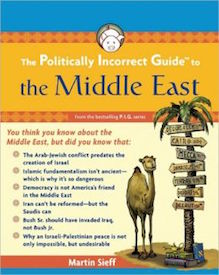The Politically Incorrect Guide™ to the Middle East
Special Conservative Book Club hardcover edition — not available in stores!
The Middle East: it’s a region that’s almost never off the front pages –yet it’s one that most Americans know little about. The mainstream media and Ivy League academics only make matters worse by casting everything in the usual politically-correct mold: Arab terrorists are just desperate freedom fighters, and the region’s one Western-style democracy ? Israel — is the oppressor, not least because of its alliance with America. And if Islamic extremism is a problem, the establishment tells us, it’s only because, like Christian fundamentalism at home, it’s rooted in that source-of-all-evils: religion. A different strain of political correctness has seeped into some minds on the right ? most notably the Bush administration, who, so ready to buy into the egalitarian myths we are all taught, believed that Western-style democracy could flourish anywhere. Now, in The Politically Incorrect Guide? to the Middle East, veteran Middle East correspondent Martin Sieff puts the lie to all these myths and clich?s ? and gives you everything you need to know about the region to understand its past, its present, and its possible future.
In The Politically Incorrect Guide? to the Middle East, you’ll learn:
Why the Arab-Israeli conflict today isn’t about borders — and never was
How the Arab states openly declared their determination to prevent a Jewish state from being born in 1947 — 20 years before the West Bank and Gaza were first occupied
Why Islamic fundamentalism isn’t ancient -? and why that only makes it more dangerous
How environmentalist extremists have kept us hooked on oil from the Middle East
Why Iran can’t be reformed — but the Saudis can
How, for 30 years, the British supported parliamentary democracy throughout the Middle East — but it didn’t work
How free democratic elections actually helped cause Iraq’s civil war — and boosted the clout of America’s greatest enemy in the country
Why importing too much democracy too fast was always a recipe for disaster — as the Carter administration found in Iran in the late 1970s
Why Britain’s post-World War I Middle East policy was a comedy of errors and incompetence that soon escalated into tragedy
How Winston Churchill conceived the idea of Iraq as a separate country when he was Britain’s colonial overlord — and why he came to regret his creation, taken at the urging of romantic British Arabophiles like T.E. Lawrence
D?j? vu: how the Shiites of Iraq led a ferocious nationalist uprising against an English speaking superpower that wanted to bring western-style democracy to their country ? in 1920
How the Shah of Iran’s dependence on the U.S. and his honeymoon with Israel in the 1950s and 1960s deluded both countries into believing that Iran was inherently moderate, anti-Arab and pro-Western ? and why they couldn’t have been more wrong
Why anti-American and anti-Israeli popular sentiment grew dramatically during the Shah’s rule — preparing the way for Ayatollah Ruhollah Khomeini’s Islamic revolution
How Britain’s hand-picked Muslim leader in Palestine later gave Hitler his enthusiastic support for the Holocaust
How Bosnian Muslims volunteered to guard the death trains that carried thousands of Balkan Jews to Auschwitz
How the Israelis helped block a Nazi takeover of Iraq before there was even an Israel
Where America went wrong in Iraq: how U.S. policymakers vastly underestimated the intransigent, unsophisticated and anti-Western nature of its competing communities
Why disbanding Saddam’s old, much feared army structure was another mistake
How Washington policymakers obsessed with crafting Iraqi democracy ignored the more pressing issues of guaranteeing law and order and of producing enough food, heating fuel, gasoline and other necessities
How, in an eerie foreshadowing of today’s policies, President Carter was so obsessed with fostering democracy and human rights in Iran that he left the way open for Khomeini to seize power
How the Muslim nations of the Middle East only took an irrevocable turn towards radical Islam not in the 10th century or after the Fall of Baghdad to the Mongols in the 13th century — but in 1979
Creating Osama: how the Soviet invasion of Afghanistan inspired successive U.S. administrations to fund Islamist mujahedin guerrillas
How Saudi Arabia’s security forces defeated al-Qaeda in that nation — and why you never heard about it
How the Saudis also instituted a gradual but increasingly effective policy of state control to marginalize and discredit Islamist leaders
How the Saudis even secretly but strongly cooperated with Israel against their common foes of al-Qaeda, Islamic extremists and the new radical leadership of Iran
How ambitious comprehensive solutions to the Arab-Israeli conflict, such as the one envisaged at Camp David, are likely to be followed by a rapid return to bitter and bloody hostilities
The Arab dictators: why we’ll miss them when they’re gone
In the Middle East, the cost of PC distortions can be measured in the lives of American soldiers, Iraqi civilians, Iranian dissidents, and Israeli Jews. Pretending there’s some sort of moral equivalence between Israeli missile strikes and Palestinian suicide bombers, acting as if our current war is against “terror” rather than radical Islam, believing that what works here will work there — all of these PC delusions weaken the U.S. and draw out the violence there. The Politically Incorrect Guide? to the Middle East is a bold first step toward facing the hard truths without which peace is impossible.
Tags: Martin Sieff, The Politically Incorrect Guide to the Middle East
- The Author

Martin Sieff
Martin Sieff is the chief news analyst of United Press International. He has reported from the Middle East for thirty […] More about Martin Sieff.
Ratings Details














